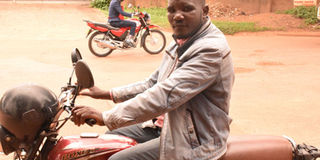Lockdown: Boda boda rider’s tale of survival

The switch. Muhiire has had to switch from carrying passengers to deliveries and luggage after the President banned public transport. PHOTO BY ELIZABETH KAMURUNGI.
Elisez Muhiire’s source of income suddenly dried up when President Museveni banned public transport last month.
This had sought to curb the spread of the deadly Covid-19 that is ravaging the world.
For a rider like Muhiire, to whom life and survival depended on the little money earned a daily basis, it was uncertain how he, his wife and two children would survive life in Kampala.
Government efforts to mitigate the pandemic, including banning public gatherings, markets, bars and encouraging people to stay home, have paralysed the economy as a whole, with immediate impact felt by those in the informal sector such as Muhiire.
He, therefore, resorted to cargo delivery and running errands to make ends meet. This followed help from one of his customers who shared his details on Twitter. The helpful customer also tipped Muhiire on safety and preventive measures to take, such as wearing gloves, and maintaining personal hygiene. This would also help reassure his clients.
Muhiire, whose stage is at Mirembe stage near Kisugu Police Station in Kampala, has been getting clients from Bukasa, Bunamwaya, Muyenga, Namuwongo and other areas.
He says he started getting calls from random persons for whom he has been making different deliveries in different places.
“Most people send me to buy food from markets. They call me and we agree on the charges,” Muhiire says.
The fares, he says, have doubled because previously, when he was carrying passengers, one was assured of picking another on return. This is not the case with cargo delivery, though.
Previously, he would on average charge Shs5,000 for a passenger from Kampala City Centre to Bukasa, but now, a delivery from Nakasero Market to Bukasa goes for an average of Shs10,000 or more.
“We made more money with passengers because we would work all day but with deliveries, you get about three customers per day… on a good day, I would make about Shs60,000 but now the most I have made during the lockdown is Shs25,000 and on some days nothing,” he says.
On a bad day when he does not get any customers, Muhiire and his family of three survive on the little savings he had made.
“We are just not sure how long we can survive on it, especially if the ban is not lifted. We are waiting for what comes next,” he said.
Muhiire’s persistence, although it helps him support his family, highlights the reality of many Ugandans who cannot afford to miss a day of work to survive.
The corona outbreak has put economies across the world on a standstill.
Finance minister Matia Kassaija recently said the outbreak had taken a toll on the economy, with at least two million Ugandans at the risk of being pushed into poverty.
Such consequences are expected to be particularly dire for the informal sector, which has no safety nets. To make it worse the ban was on Tuesday extended to May 5 and the Central Bank has already indicated that the extension is likely to force a contraction in the economy to either 2.3 per cent or 3 per cent from 4 per cent.
The extension of the lockdown has also come with new measures such as stopping cargo deliveries by motorcycles by 2pm, which adds salt to injury for the likes of Muhiire.
“Yesterday [Wednesday] I didn’t make any money because before you know it time is finished. I cannot tell how we are going to survive, things just got much more difficult,” he says.
The brutality by some law enforcement officers also presents a challenge to survival in these difficult time.
Despite the difficulties, Muhiire believes the tough measures are effective and have been helpful in keeping Ugandans safe from the virus.
He has not transported any passenger since the ban. He also appreciates the food distribution by government, but believes that interventions into rent and electricity bills would be equally helpful.
Lockdown extension
The 21 days extension end on May 5, although it remains unclear whether it will be lifted.
Government spokesperson Ofwono Opondo, while on a radio talk show recently, said it is important for Ugandans to prepare for a scenario where the lockdown maybe longer than earlier anticipated.
Uganda is fairing considerably well in controlling the spread of the virus, with 55 cases registered by Friday.
The welfare of Ugandans, however, remains in a precarious state, with the economy badly hit, from all angles be it airlines or boda bodas.
For now though, Muhiire awaits the President’s next move but hopes that all this will pass soon.



